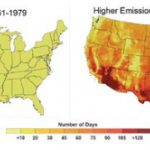climate change
The Economist's reputation as the intellectual's news outlet of choice is probably undeserved -- its questionable choice of correspondents and lack of bylines, heavy editing and conservative politics undermine it's credibility in my book -- but because it's widely read in elite circles, it's hard to ignore. So the magazine's feature treatment of climate science is worth looking at. I am pleased to report that, while The Economist may be a straggler when it came to embracing the science, it is now fully on board.
In any complex scientific picture of the world there will be gaps,…
BILLINGS, Mont. -- A federal judge has approved a first-of-its-kind settlement requiring the government to suspend 38,000 acres of oil and gas leases in Montana so it can gauge how oil field activities contribute to climate change.
-- The Washington Post's Matthew Brown has the provocative details.
A new Gallup poll suggests that Americans are less worried about most environmental issues than they have been since Gallup began polling 20 years ago.
"Americans are less worried about each of eight specific environmental problems than they were a year ago, and on all but global warming and maintenance of the nation's fresh water supply, concern is the lowest Gallup has measured. Americans worry most about drinking-water pollution and least about global warming."
People grasp what their drinking water has to do with them. Overwhelmingly, I think they do not fully grasp what global warming…
From our friends at NOAA's National Climatic Data Center, in Asheville, N.C., we learn the following:
The combined global land and ocean average surface temperature for February 2010 was 0.60°C (1.08°F) above the 20th century average of 12.1°C (53.9°F). This is the sixth warmest such value on record.
The combined global land and ocean average surface temperature for December 2009 - February 2010 was the fifth warmest on record for the season, 0.57°C (1.03°F) above the 20th century average of 12.1°C (53.8°F).
For the year to date, the combined global land and ocean surface…
Logging the Onset of The Bottleneck Years
This weekly posting is brought to you courtesy of H. E. Taylor. Happy reading, I hope you enjoy this week's Global Warming news roundup
skip to bottom Information overload is pattern recognition March 14, 2010 Chuckles, COP15, COP16 and Beyond, Paris, Wrong Green, CERA, Outsourcing CO2, World Bank, UN CFG IPCC Review, IPCC Support, CRU Theft, UK Wind, Samanta, Anthony's Question, NASgate Melting Arctic, Methane, Geopolitics Food Crisis, Svalbard, Land Grabs, Food Production Hurricanes, GHGs, Temperatures, Aerosols, Paleoclimate…
Randy Olson says:
There comes a point where the public DOES want to see the science community stand up for themselves.
And as if on cue comes the release of another round of once-private emails among members of one section of the National Academies of Sciences alerting us to efforts to do just that. The NY Times has a Greenwire story on it, but you need to read the actual emails.
How can we sit back while many of our colleagues and science as a whole is under massive attack?" asks Paul Ehrlich.
"People who have an open mind are wondering about the absence of any coordinated and
publicized…
Logging the Onset of The Bottleneck Years
This weekly posting is brought to you courtesy of H. E. Taylor. Happy reading, I hope you enjoy this week's Global Warming news roundup
skip to bottom Sipping from the internet firehose... March 7, 2010 Chuckle, Copenhagen, Yvo de Boer, COP-16, UN-CFG, Anthony's Question, Precautionary Principle, Greenhouse Effect Bottom Line, Carbon Tariffs, World Bank, AAAS, IPCC Review, Interpreting Polls, Pushback, CRU Inquiry Melting Arctic, Polar Bears, Methane, Geopolitics, Antarctica Food Crisis, Food vs. Biofuel, Land Grabs, Food…
Real Climate has an analysis of the methane release paper up, which is at least partly reassuring - partly.
CO2 is plenty to be frightened of, while methane is frosting on the cake. Imagine you are in a Toyota on the highway at 60 miles per hour approaching stopped traffic, and you find that the brake pedal is broken. This is CO2. Then you figure out that the accelerator has also jammed, so that by the time you hit the truck in front of you, you will be going 90 miles per hour instead of 60. This is methane. Is now the time to get worried? No, you should already have been worried by the…
From up north, we have some more troubling news. Actually very troubling. Catastophic release of methane hydrates is a prime suspect in a few events dramatic enough to show in the earth's geological records, coarse and obscured as that record may be. (Our actions today will be featured prominently in that record for anyone looking back a million years from now.) It has been a worry for many years that humanity is running the risk of triggering such a release again, which would truly pile disaster on top of calamity.
New research coming out in Science today indicates that this most dire of…
I haven't had a chance to read the original paper - I'm getting ready to head out of town and probably won't get to it until next week, but I just got a press release from U Alaska Fairbanks about a recent paper in this month's issue of Science that suggests that we've got bigger methane problems than we knew about.
From the UAK press release:
The research results, published in the March 5 edition of the journal Science, show that the permafrost under the East Siberian Arctic Shelf, long thought to be an impermeable barrier sealing in methane, is perforated and is leaking large amounts of…
Note: This is another lightly revised version a piece I wrote some years ago at the oldest incarnation of this blog. It answers a question I get a lot - if people have been saying that the oil is going to run out for years, and if 30 years ago people thought we were going to have an ice age, why should I believe you that peak oil and climate change are real problems.
A lot of what I write works from the assumption that we all agree that peak oil and climate change are happening and going to be life-changing events. And yet, some people who read this blog don't necessarily agree on this…
Leslie Kaufman in the New York Times presents a disturbing tale of attempts by creationists to up their chances of slipping religion into science classrooms by piggy-backing it onto "balanced" instruction of climatology.
The linkage of evolution and global warming is partly a legal strategy: courts have found that singling out evolution for criticism in public schools is a violation of the separation of church and state. By insisting that global warming also be debated, deniers of evolution can argue that they are simply championing academic freedom in general.
Yet they are also capitalizing…
It's a sore spot for some climate change pseudoskeptics. Any time anyone makes any kind of claim about the effects of a warming planet on tropical storm activity, you can count on a deluge of rejoinders about how shaky the science on the subject really is.
Much is made of Al Gore's use of an image of hurricane spewing forth from a smokestack on a promotional poster for "An Inconvenient Truth." And Chris Mooney devoted an entire book to exploring the science, and the battles over and about the science, Storm World. I was commissioned by the Weather Channel a couple of years back to write a…
John Broder writes today in the New York Times that the uproar over the unauthorized release of hundreds of emails and recent revelations about a mistake in the IPCC report threatens to undermine decades of work and has badly damaged public trust in the scientific enterprise.
Broder's interviews with scientists reveal two thoughtful but seemingly opposing viewpoints:
'Ralph J. Cicerone, president of the National Academy of Sciences, the most prestigious scientific body in the United States, said that there was a danger that the distrust of climate science could mushroom into doubts about…
As regular readers will know, I prefer the term "pseudoskeptic" over "denier" when it comes to those who insist we needn't be worried about climate change. This is because the common denominator among any set of such characters tends to be a misapplication of the scientific method, a failure to apply rigorous skeptical analysis to the subject. Not all of these pseudoskeptics are deniers, as this list from Foreign Policy makes clear.
Indeed, the distinctions among the selected "Guide to Climate Skeptics" make it even more important to choose our descriptors carefully. I would argue that…
I have an enormous amount of respect for Stuart Staniford, who I think is one of the best minds working on our collective ecological crisis. That said, we've had some serious debates, because I've tended to think that our situation, particularly our longer term food situation, is more serious than Staniford has - but those debates on my end have always included just a profound gratitude for the kind of analytic work he does.
(Days over 100 degrees in projected high emissions scenarios)
Staniford has done a fabulous review (Note: apologies for linkage problems, they should now be fixed!)…
So Tim Lambert has been a busy blogger this last month with some really first rate investigative work on the truly abysmal rash of shoddy climate journalism in the UK. Check out his Leakgate category for a multitude of "must read" postings.
Also see Eli on Leakeng Ships. for another run down of Tim's work.
Real Climate did a good roundup of the phony spate of IPCC scandals as well, here and here (if you only click one of those links, click the first because it has some excellent background on the IPCC to add some reality perspective to the whole mess).
I don't understand how reporters can…
I knew I could count on my fellow Science Blogger Dr. Klemetti for a good take on the physical reality of the Chilean Earthquake, so I checked in this morning, only to see him, quite property, take the MSM to task for inane rhetoric, notably an MSNBC headline that reads "Is Nature Out of Control?"
Klemetti rightly observes that this is bad science. He points out:
Earthquakes happen, and they happen in a random distribution (more or less), meaning sometimes we get more, sometimes less. Spend any time looking at the USGS earthquake feed and you'll see sometimes we have lots of M3+ earthquakes…
Here is a nice short film (~20 minutes) about ocean acidification, the "other carbon dioxide problem", the reason geoengineering "solutions" like orbiting sun shades are not solutions.
It is only about one third doom and gloom, sandwiched between the natural beauty of what we have now in the beginning and some hopeful prospects for the future at the end.
I found it worth watching:
(thanks go to MT for posting it at his place.)


